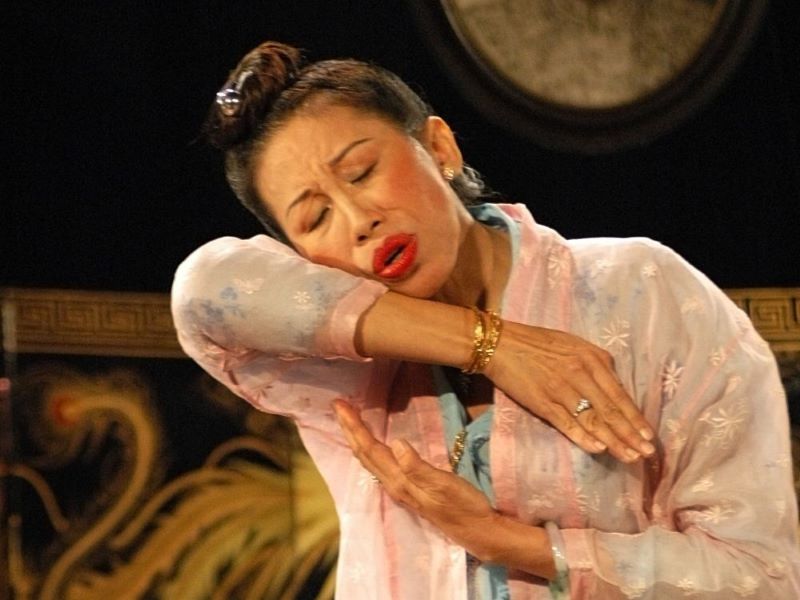
Resilience keeps Chua's character going (Photo: Low Yen Yeing/The Edge)
Pearlly Chua has played Emily of Emerald Hill 223 times over 34 years, prompting people to ask, “Again?” when there is news of another run. Will there come a time when she feels she has had enough of the matriarch who manoeuvres the complexities of life in a Peranakan household?
“I think if I stop breathing. Because life involves breathing,” Chua says in a heartbeat. “Do you tire of living? I’m not tired as an actress or a person. Emily is about everyday living; it’s organic.”
Art and reality overlap in the play, she adds. “Every few months, something major happens that gives you different insights into your life. As a mother to a 43-year-old son, you think you know everything about raising a child, growing old and all that. I’m 68. When you cross the threshold into 70 and 80, you look at things differently. You’ve got to do a retake. I’m very adjustable, very adaptable.”
Guests can expect to see something different when Heeren Mansion presents Emily on Nov 23. If ever a place feels right for a show, this lavish, refurbished home in Melaka is it. The audience will be whisked away to the big Peranakan house in Singapore where Stella Kon’s one-woman play unfolds.
Chua, who also teaches acting and performance, recently wrapped up filming for Chong Keat Aun’s Mother Bhumi, set for release next year. She plays paddy farmer Har Ji, who falls victim to a hex because of a land ownership dispute, which takes its cue from the historic Anglo-Siamese Bangkok Treaty of 1909.
She has worked on one short movie and three other feature films by the Malaysian director, including the recently released Snow in Midsummer, about a Chinese family caught up in the May 13 riots of 1969.
Emily is a different story about struggle and survival. It follows a poor 14-year-old who becomes the second wife of wealthy widower Gan Joo Kheong and how she tries to curry favour with her mother-in-law and fit into affluent social circles, and eventually ruling the roost.
“She is essentially a woman of the world who has survived all that she needed to survive. As the youngest daughter-in-law holding the supreme position of wife of the No 1 son, she had to fight tooth and nail to step into the hierarchy. She’s fought a lot of battles, won a lot, lost some. Over the years, she has realised there are some things she has to let go. But how soon do you let go, and how do you do it?
“There are so many wonderful lines in the play and you can interpret them how you think they should, and breathe them. But every few years, your attitude towards people changes. You talk about love and respect. But how much?”
Chin San Sooi directed Leow Puay Tin in the world premiers of Emily in Seremban exactly 40 years ago. Since 1990, he has worked only with Chua, and keeps count of her shows.
“We’ve gone through the script with a fine-toothed comb. We’ve layered it so much that it is almost like the Indonesian kuih lapis, ever so thin, ever so fine,” she says.
chua.jpg

They have moved from voice training, body language and stagecraft in the early years to an easy understanding when it comes to sculpting the character and imagery, and what they want to do — the result of transitioning from mentor and student to being friends. The pair got acquainted in 1983 when Chua played Maiden Green in Chin’s Lady White.
Characters return to Emily’s life as she ages before the audience and the dynamics of the relationships shift. “We have grown, too — San Sooi’s vision and my interpretation.” Looking out from the stage, Chua reckons young wives and mothers watching the show again after several years would have changed as well. They may realise something about themselves, like, ‘Why so intense? Sua sua lah [Let it go]?’
“Emily is fleshed out and is so well written it would be worth the while for the world to see it. It’s not just about the Nyonya-Baba culture” — which this Singapore-born actress is very proud of. Her orientation is Penang Peranakan because her parents are born there and she grew up with its food, and speaking Hokkien.
Whether it is a hall filled with theatre buffs or an audience of one, Emily holds her own with a story that speaks to all. Chua recalls performing in a Chinese wayang kind of setup before a lady sitting alone in Melaka in the early 1990s. “At the end of it, she cried and apologised that her people missed such a good show. She said, ‘You didn’t even compromise.’ I told her she was very important because she made the time to come.”
Does familiarity breed contempt? “Yes, I have to watch it and not go into auto mode. Every time I perform, it has to be like I’m doing it for the first time. I find that fun, not monotonous.”
At the Damansara Performing Arts Centre in Petaling Jaya last year, they did a series of stripped-bare performances that saw Chua wearing a tee-shirt and sarong, minus real jewellery, ornate furniture, special lighting and other props.
The idea was to bring down ticket prices to attract a younger crowd. Devoid of all embellishment, the setup also gave viwers space to imagine, she says. About half of almost every show during that run had a brand-new audience.
Which aspect of Emily does she identify with most? “Her resilience. The nothing-can-keep-her-down side which says, ‘Tomorrow is another day and I have to live’.”
Chua saw this same indomitable spirit in her Nyonya grandmother. Resilience keeps her character going. Hopefully, it will do the same for actress and director. Then Chin can keep adding up the number of her performances.
A universal story that endures
singapore_playwright_stella_kon_credit_jimmy_yap_for_pic.jpg

A Peranakan matriarch modelled after an author’s grandmother, portrayed by a nyonya who draws from three decades of her own life to shape the character, which evolves from young bride to ageing grand dame on stage. If all this sounds like a mouthful, there is more — especially when Emily Gan prepares traditional dishes for her extended household in Emerald Hill.
Stella Kon’s one-woman drama that won Singapore’s National Play-Writing Competition 1983 was first staged in 1984. It has strong legs still, thanks to the indefatigable efforts of Malaysian director Chin San Sooi and actress Pearlly Chua, who are taking Emily to Heeren Mansion, a refurbished Melakan home in Jalan Tun Tan Cheng Lock, on Nov 23.
“For over 40 years, San Sooi has directed different actresses in this play,” Kon says.” I understand he works with them day by day, to reshape different visions of the character. The vision grows and changes, and each performer brings her own power and feelings to inhabiting Emily. His core vision of her has not changed in all the years since he was the first person to believe this monologue could be done on stage.”
The 80-year-old Singapore playwright has always envisioned Emily as “a timeless unity” and the work portrays one woman’s infinite variety. As for Chua, who has played Emily many times over the years, Kon says: “Having physically journeyed with the character through decades of her own life must have been almost transformative”.
Emily of Emerald Hill has been translated into various languages, including French, Japanese and Icelandic, and performed in various countries. Of these, Kon has only seen the French version, in which the actress did away with the sarong, a typical attire among Straits Chinese women in the 1950s and 1960s.
“It was as though they decided to leave out the Peranakan aspect and focus on Emily the homemaker, mother and wife, which is fine by me. In writing the play, I never meant to create a Peranakan icon. I just made her [that] because my own grandmother was one.”
Grandma was charming, energetic Polly Tan, who ruled over Oberon at 117, Emerald Hill Road — the model for the Gan mansion teenaged Emily moves into after marrying a man twice her age.
Four decades is a long time for a play to continue to be staged and wow people in different countries. Reflecting on Emily’s longevity, Kon says: “I could question that by citing a list of classics from Shakespeare to Bertolt Brecht.”
As for its universal appeal, “leaving aside the ‘Peranakanness’, it is a story of a woman’s struggle, which resonates with many people”.
In 2016, Kon wrote Emily the Musical, set to music by Desmond Boey. Besides other plays, poems, verses, short stories and novels, she also has an artistic hand, producing sketches and watercolours. But it is always her monodrama that is remembered and mentioned.
Does being recognised for one particular piece of writing overshadow the rest of her output?
“I do feel that my other work is not well-known, but maybe they would not be [too] even if Emily did not exist. How can we tell?”
What she also cannot say for sure is whether the play is still being used as an academic text. “Fewer schools than before, possibly some tertiary institutions … I wouldn’t really know.”
Personal growth and redemption remain themes that are important to Kon and she explores them with words. Is she doing any writing now?
“I hope to work on the story of Lim Boon Keng, on whom I’ve already written a musical [in 2019]. Given my age and decreasing strength, it’s hard to say whether it will ever be completed.”
There is lots to tell about Peranakan physician Lim, her great-grandfather, who advocated social and educational reforms in the early 20th century. He helped establish the Singapore Chinese Chamber of Commerce in 1906, and three banks — the Chinese Commercial Bank, Ho Hong Bank and Oversea-Chinese Bank.
As for where she hopes Emily will go in the next 40 years, especially with most viewers today having no idea of life in the matriarch’s time, Kon says: “I don’t know, and I won’t be around
to see it. I wish her well.”
'Emily of Emerald Hill' will be performed at Heeren Mansion, Jalan Tun Tan Cheng Loke, Melaka, on Nov 23 at 3pm and 8:30pm. Tickets at RM125. To book, call (012) 606 3666.
This article first appeared on Nov 18, 2024 in The Edge Malaysia.


